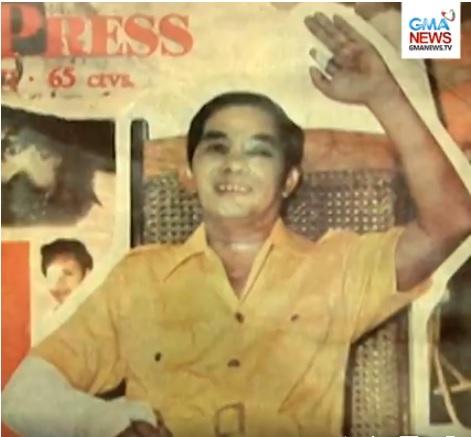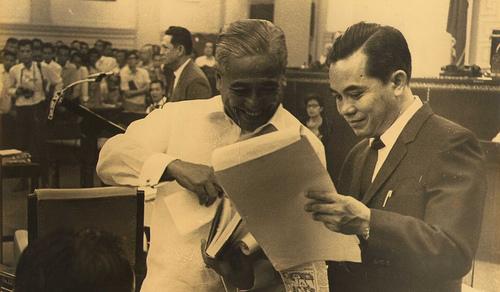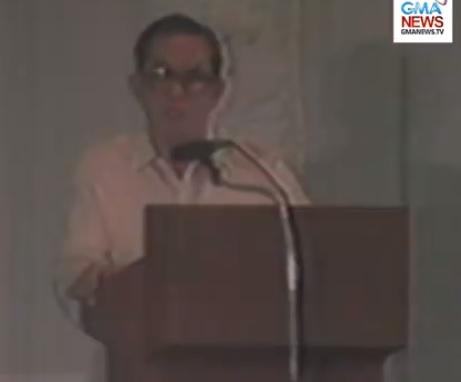It was a joy for a journalist to cover Jovy Salonga
It was in the late 1980, when I first met Sen. Jovito Salonga in flesh and blood. It was the height of martial law and dictator Ferdinand Marcos ruled with iron fist without mandate from the Filipino people. His term of office was supposed to end in 1973, but he used martial rule to hang on beyond the end of his term.
Salonga was part of the anti-dictatorship struggle. He was among the forces comprising the democratic opposition, which called for an end for the Marcos dictatorship and the holding of credible and honest elections to pave the way for the restoration of democracy.
Salonga led in the creation of the United Democratic Opposition, or Unido, a bipartisan group of political leaders, which offered what they described as the “democratic alternative,” which was to force Marcos to step down and call for the holding of free, clean, and orderly elections for new leaders.
Comprising the Liberal Party contingent in Unido was Sen. Gerardo Roxas, who was LP president, Salonga, former President Diosdado Macapagal, among others. The Nacionalista Party contingent was headed by Sen.Salvador Laurel, Speaker Jose Laurel Jr., Sen. Ambrosio Padilla, among others. Roxas and Laurel were Unido co-presidents.
Even the democratic opposition was being radicalized during those days, as Marcos would not yield to criticisms that he was governing without mandate.
The democratic opposition leaders were beginning to see the wisdom of what the political activists were saying – that only a violent upheaval would end the Marcos dictatorship.
I remember Jovy Salonga calling for a press conference in late 1980 after Marcos released him after days of imprisonment. Salonga was implicated as among those behind the series of Manila bombings initiated by the clandestine April 6th Liberation Movement, a group of Jesuit educated activists.
Col. Balbino Diego, the legal counsel of the Presidential Security Command, alleged that Salonga was part of the underground group on the basis of a captured photograph, showing him with Victor Burns Lovely, a Filipino-American who nearly died when the bomb he was preparing prematurely exploded in a rented at YMCA in Manila.
During the press conference attended mostly by members of the Manila-based foreign media as the pro-Marcos crony press hardly covered opposition initiated events, I saw his mangled left hand, the ubiquitous hearing aid, and scars of shrapnel wounds in his hands and neck and the blind left eye, which had an artificial eyeball.
Salonga was the most badly injured in the August 21, 1971 Plaza Miranda bombing. An unknown assailant threw a pair of hand grenades to the LP political rally in a city square described as the country’s “center of free expression.”

Salonga was given up as dead, but somehow the doctors who attended to him did what could be regarded a miraculous job to revive him. He survived, in brief, but not without leaving those scars and other marks of unforgivable violence.
I noticed that Salonga was a small man, probably standing five feet three inches, or even shorter. But he had a remarkable intellect. He spoke with an unusual lucidity of thought. The brevity of words was ably matched by the clarity of ideas coming from his brilliant mind.
It was a joy for a journalist to cover him. I found intellectual satisfaction in savoring those words and ideas of a brilliant man. Those quotes came out naturally for him.
Two or three months later, I covered Jovy Salonga, who sat on a table with Gerry Roxas and Doy Laurel to oppose the “paper lifting” of martial law on Jan. 17, 1981. Despite the lifting, Marcos retained the powers to legislate and kept the suspension of the privilege of the writ of habeas corpus that enabled him to arrest and jail people without warrants and court charges.

Then, Marcos, reacting to criticisms that he was ruling without any mandate, announced the holding of presidential elections on June 17, 1981. It was Jovy Salonga’s show, as he spoke brilliantly on the ultimate necessity to boycott the elections.
I remember Salonga arguing quite passionately that any participation by the democratic opposition to what he described “farcical and sham president elections” would only provide legitimacy to the illegitimate government of Marcos.
Salonga succeeded as the Unido-led democratic opposition chose to boycott the elections, outsmarting Doy Laurel and Reuben Canoy, who favored participation, and forcing Marcos to look for an opponent. He asked a bosom buddy, Jose Roy, a former senator and leader of the Nacionalista Party, to look for somebody, who could provide the token opposition.
Roy fielded Alejo Santos, the former defense secretary of President Ramon Magsaysay. His campaign manager was Francisco Tatad. Of course, Marcos handily won over the hurriedly picked token opposition candidate.
Marcos allowed Jovy Salonga to leave for the United States in late March 1981 ostensibly to seek medical help on the effects of the Plaza Miranda bombing on his frail body. He was in the US, when Sen. Benigno “Ninoy” Aquino Jr., his party mate and friend, was assassinated on August 21, 1983.
Seeing the emergence of the widespread opposition against the Marcos dictatorial regime and its widening unpopularity, Salonga returned to the Philippines sometime in January, 1985. I was among the throngs of journalists, who covered his arrival press conference at the National Press Club in the Manila district of Intramuros.
In that press conference, Salonga declared his intention to lead in the revival of the Liberal Party, which hibernated after the 1982 death of Gerry Roxas (he died of liver cancer) and 1983 murder of Ninoy Aquino.
He was the natural choice to lead the LP; no one among the leading party leaders had the national stature to assume its leadership.
But what stuck into my mind during that fateful press conference was Salonga’s declaration that when the US–Philippines Military Bases Agreement ended in 1992, the Americans had no choice but to leave. Salonga did not engage in double talk. He just laid down the basic arguments.
I did not have the prescience at that time to see the wisdom of his words. In hindsight, which is always 20/20, what Salonga said during that press conference would become the basis of his own opposition against moves to extend the military bases agreement beyond 1992. Salonga was already the man of the hour during those days on the US bases issue. He won.
As the opposition against the Marcos dictatorship raged during those days, Salonga was among those who worked for the ascent of Cory Aquino to become the candidate of the unified opposition against Marcos in the fateful 1986 “snap” presidential elections.
The LP was not strong to show political muscles during those days, but under his leadership, it coalesced with other democratic forces to ensure fighting chances for the Cory Aquino–Doy Laurel ticket.
Salonga was the natural choice to head the Presidential Commission on Good Government (PCGG), when the Cory Aquino government assumed power by virtue of the 1986 EDSA People Power Revolution. He was an expert of international law, which is very important in the Philippine government claims over the illicit wealth stashed here and abroad by the Marcoses, cronies, and ilk.
The PCGG, largely under Salonga’s leadership succeeded in giving a perspective on the Marcos kleptocratic rule. I covered the PCGG during those days. In one press conference, Salonga gave the magnitude of the ill-gotten wealth of the Marcoses and cronies at between $5 billion to $10 billion. This has become the operational premise of the entire recovery efforts.
Salonga stayed only a year at the PCGG, after which, he was elected to the Senate to become the first Senate president in the post-Marcos era. But Salonga could be credited for providing the seminal ideas and building blocks of the entire recovery efforts.
Salonga provided the direction and clarity of thought for the recovery efforts. Its success lies in the fact that the Philippine government, through the PCGG, has recovered after 30 years a total of P170 billion in cash from those illegally acquired assets of the toppled dictator, his family, and cronies.
This figure could go up to over P200 billion when the court decides in government’s favor the remaining civil cases.

I had the privilege of covering Salonga in the 8th Congress. I saw how hard he worked to lead the Senate in the enactment of important pieces of legislation to ensure the restoration of democracy. He was among the voices that worked for the democratic structures and processes to work and propel the restored democracy.
Vital legislation like the Comprehensive Agrarian Reform Law, the Office of the Ombudsman Law, Ethical Standards Law, the Sandiganbayan Law, among others were enacted under Salonga’s leadership.
But Salonga had his share of failures too. He and Sen. Teofisto Guingona Jr. worked for the enactment of the enabling law on the constitutional provision against political dynasties. He had the Senate enact it. But the House of Representatives, led by Speaker Ramon Mitra, Jr, killed it. It did not lift a finger to enact it.
His crowning glory came when he succeeded in the non-ratification of a new bases accord replacing the old military bases that ended in 1992.
Later, he ran for president in the 1992 presidential elections, the first ever after the dismantling of the Marcos dictatorship. He did not have the luck and lost. He retired from politics after the elections.
Salonga is best remembered for being a patriot, statesman, and staunch anti-corruption lawmaker, who showed the way in combating corrupt tendencies in government. He lived modestly until his death. Moreover, his brilliant record is untainted by corruption; he was never accused of corruption though.




